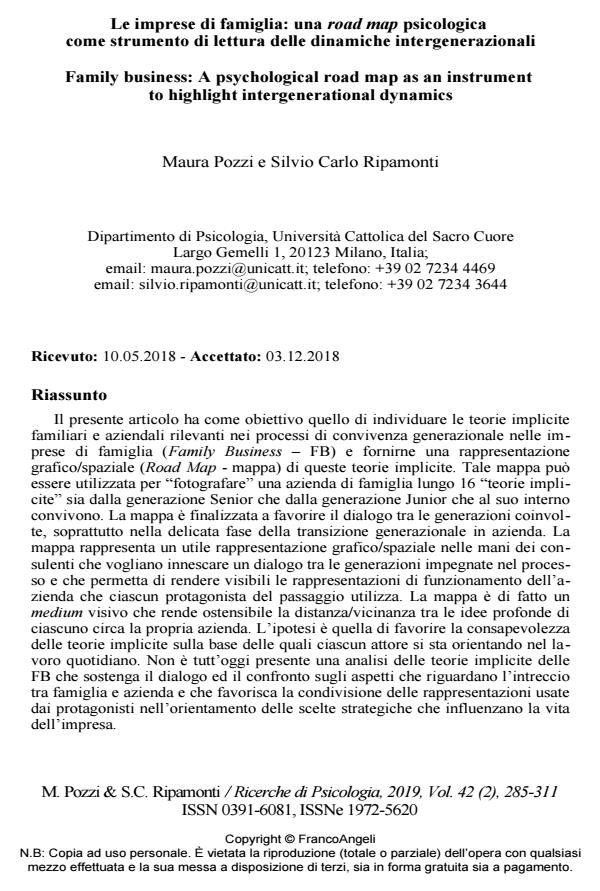Le imprese di famiglia: una road map psicologica come strumento di lettura delle dinamiche intergenerazionali
Titolo Rivista RICERCHE DI PSICOLOGIA
Autori/Curatori Maura Pozzi, Silvio Carlo Ripamonti
Anno di pubblicazione 2019 Fascicolo 2019/2
Lingua Italiano Numero pagine 27 P. 285-311 Dimensione file 364 KB
DOI 10.3280/RIP2019-002004
Il DOI è il codice a barre della proprietà intellettuale: per saperne di più
clicca qui
Qui sotto puoi vedere in anteprima la prima pagina di questo articolo.
Se questo articolo ti interessa, lo puoi acquistare (e scaricare in formato pdf) seguendo le facili indicazioni per acquistare il download credit. Acquista Download Credits per scaricare questo Articolo in formato PDF

FrancoAngeli è membro della Publishers International Linking Association, Inc (PILA), associazione indipendente e non profit per facilitare (attraverso i servizi tecnologici implementati da CrossRef.org) l’accesso degli studiosi ai contenuti digitali nelle pubblicazioni professionali e scientifiche.
Il presente articolo ha come obiettivo quello di individuare le teorie implicite familiari e aziendali rilevanti nei processi di convivenza generazionale nelle imprese di famiglia (Family Business - FB) e fornirne una rappresentazione grafico/spaziale (Road Map - mappa) di queste teorie implicite. Tale mappa puo essere utilizzata per "fotografare" una azienda di famiglia lungo 16 "teorie implicite" sia dalla generazione Senior che dalla generazione Junior che al suo interno convivono. La mappa e finalizzata a favorire il dialogo tra le generazioni coinvolte, soprattutto nella delicata fase della transizione generazionale in azienda. La mappa rappresenta un utile rappresentazione grafico/spaziale nelle mani dei consulenti che vogliano innescare un dialogo tra le generazioni impegnate nel processo e che permetta di rendere visibili le rappresentazioni di funzionamento dell’azienda che ciascun protagonista del passaggio utilizza. La mappa e di fatto un medium visivo che rende ostensibile la distanza/vicinanza tra le idee profonde di ciascuno circa la propria azienda. L’ipotesi e quella di favorire la consapevolezza delle teorie implicite sulla base delle quali ciascun attore si sta orientando nel lavoro quotidiano. Non e tutt’oggi presente una analisi delle teorie implicite delle FB che sostenga il dialogo ed il confronto sugli aspetti che riguardano l’intreccio tra famiglia e azienda e che favorisca la condivisione delle rappresentazioni usate dai protagonisti nell’orientamento delle scelte strategiche che influenzano la vita dell’impresa.
Parole chiave:Imprese di famiglia, cambiamento, teorie implicite, family business, transizione generazionale.
- Organisational Welfare in Italian SMEs: The Process of Valorising Human Resources Chiara D’Angelo, Diletta Gazzaroli, Caterina Gozzoli, in Sustainability /2020 pp.9318
DOI: 10.3390/su12229318 - Generation and Gender Differences in Family Businesses: A New Psychological Perspective Maura Pozzi, Carlo Pistoni, Silvio Carlo Ripamonti, Amalia De Leo, in Journal of Family and Economic Issues /2023 pp.919
DOI: 10.1007/s10834-022-09881-w
Maura Pozzi, Silvio Carlo Ripamonti, Le imprese di famiglia: una road map psicologica come strumento di lettura delle dinamiche intergenerazionali in "RICERCHE DI PSICOLOGIA " 2/2019, pp 285-311, DOI: 10.3280/RIP2019-002004